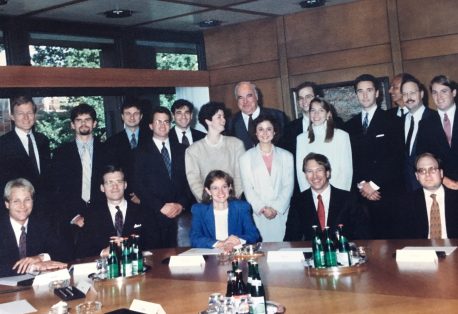Crister Garrett (Bosch XI) posthumously received the 2019 Bosch Alum of the Year Award for his high-level impact on the transatlantic relationship. Crister, who passed away on March 6, 2019 in Leipzig, Germany, dedicated his life and career to expanding and strengthening German-American relations. A respected transatlantic scholar even before participating in the Bosch program, Crister created institutional legacies on both sides of the Atlantic that have already had a tremendous impact and will continue to do so beyond his lifetime. Even more importantly, Crister was an inspirational teacher and mentor to thousands of students, passing on to so many his own deep intellectual curiosity and genuine enthusiasm for building bridges between the United States and Germany. Crister, more than just about any alumnus/a we know, embodied the goals of the Bosch Fellowship Program and lived them every day of his life.

Crister’s impressive resume attests to his remarkable achievements in transatlantic and German-American academia. In 2000, Crister designed a compelling proposal and was selected to lead one of the first Centers for European Studies in the United States at the University of Wisconsin – the 6th largest U.S. research university, which hosts 44,000 students. After launching the Center and initiating programs and exchanges that made it a crown jewel of the university’s strong international focus, he was recruited a few years later to lend his academic expertise and institutional knowledge to help re-establish transatlantic ties at Germany’s second oldest university. The University of Leipzig, where Crister had served temporarily as a Fulbright professor, was looking to give new impetus to their American Studies program – the other side of the coin of what Crister had just done in the Midwest.
There, since 2005, he and his Leipzigerin wife Claudia and daughters Kajsa and Sanna became part of the Leipzig renaissance. As testament to how determined the University was to land him permanently, the Laender-level bureaucracy had to break new molds to hire a foreigner as a full professor of American Studies. Over the years, Crister expanded the programs and profile of the Department, and assumed greater responsibilities in leadership. He created and served as the Director of the American Space in Leipzig, a multi-media program and policy platform housed in dedicated public space within the University and supported by resources from the U.S. government. His leadership at the University and his strong ties with partner organizations such as the DAAD and the Holzbrink Verlag led to the creation of the most successful transatlantic literary exchange in decades. As a result of Crister’s shepherding of the program, Leipzig has hosted 26 prominent American guest authors – one each semester since 2006 to teach, write and present at the University. Crister’s personal conviction that students learn best in an environment that combines classroom interaction, with research-driven projects, practical learning, cross-cultural experience and professional training transformed into what the University now dubs “The Leipzig Model” for American and international studies.
Through lectures, publications, and the media, Crister was among the leading academic experts on transatlantic and specifically German-American issues, up until just shortly before his death. During U.S. election cycles, when U.S. officials overseas are constrained in their ability to engage in public discussions of the candidates and issues, Crister’s frank, objective, multi-faceted analysis, in fluent German, was highly sought after by German media outlets. Whether the issue related to trade, political, social, or cultural issues, Crister was a frequent voice leading discussions of these issues from both a U.S. and German perspective. Through his nationwide media engagements he broadly shaped the way German audiences at all levels and walks of life frame current policies and developments in the United States, Germany, and Europe more broadly.

In perhaps his most lasting legacy, Crister positively shaped the lives of the thousands of students he taught and the tens of thousands of participants of programs in the Centers he created on both sides of the Atlantic. In establishing the Crister Stephen Garrett Scholarship to financially assist students at the University of Leipzig to pursue studies and internships at home and abroad, Crister’s wife and daughters are continuing his goal of encouraging young people “to believe in themselves, stand up and find their own voice, and create a world that embraces its differences, knows no border, and offers everyone an equal chance.” Friends, family and colleagues contributing to the Scholarship described Crister as a brilliant, engaged and inspirational teacher and mentor; an influential and enthusiastic mover and shaker in German-American relations; and a warm, kind and compassionate Mensch.
